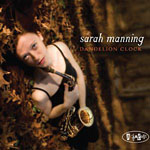 Dandelion Clock
Dandelion Clock
Sarah Manning | Posi-Tone Records (2010)
By Raul d’Gama Rose
It takes a long time for the delightful shock of first hearing Sarah Manning’s emphatic, almost blasé, voice—rich, tunefully accented and almost bronzed, as full as a sudden blast of sunshine. The first sounds of her alto saxophone are so indelibly burned in the memory that virtually everything else becomes a blur except undulating glissandos of her melodic outbursts that often end in shy tremolos. The brilliant alto saxophonist waxes eloquent in a forthright, exacting voice, with fluid and bright lines like operatic arias. She tempers them with the concrete imagery of the pastoral, melding with the elasticity of the urbane. The dissonance that arises when the two rub shoulders is palpable, yet ever so magical. Hers is a singular voice, although it sometimes recalls the sharp altissimo grace of Johnny Hodges.
On Dandelion Clock, Manning brings all her aquiline tones and textures to bear on seven unique compositions and two classic tracks that she makes her own, from the first notes. She is ably assisted by pianist Art Hirahara, an excellent foil with his tempered notes and fluid style. But then bassist Linda Oh adds her sharply stabbing notes and Kyle Struve is entrancing with his dancing, melodic manner in which he coaxes sounds from the delicately tuned drums. Much has been written about the unique imprint of Manning’s compositions. Like her alto playing, she writes like no one else. And her narratives are perfectly suited to her playing. She lets the topography of each song define the story. The crepuscular “The Owls (Are On The March)” and almost gothic “Phoenix Song” are dark nocturnes, echoing with a strange blend of the horror of post dusk hours and an almost mystical union with the sound of the night. Her saxophone is beyond evocative, in an almost prowling way.
“Through The Keyhole” comes alive with imagery that appears through sharply squeezed notes which flow abundantly. “Marble,” “Habersham Street” and “Crossing, Waiting” unravel like water colors that remain wet and almost amorphous. Only “I Tell the Time by the Dandelion Clock” suggests a slanted story with its fantastic images and melodic dalliances. Among the equally memorable moments on the album are the brilliant renderings of, first, Jimmy Rowles’ “The Peacocks,” a beautiful song full of meandering glissandos and seemingly punctuated by fatal cries at its end. Then there is Michel Legrand’s famous tune from the film The Thomas Crown Affair, “The Windmills of Your Mind.” The supercharged energy of the song is built up by a lengthy introduction with tremulous excitement, so that when the melody is first sounded, the anticipation makes it all the more breathtaking. And this is not the least because of Manning’s plaintive reading.
It may be time to explore further the breathtaking world of Sarah Manning. Dandelion Clock may be only the beginning.
Track listing: The Peacocks; Marble; Habersham Street; I Tell the Time by the Dandelion Clock; Crossing, Waiting; The Owls (Are On The March); Through the Keyhole; Phoenix Song; The Windmills of Your Mind.
Personnel: Sarah Manning: alto saxophone; Art Hirahara: piano; Linda Oh: bass; Kyle Struve: drums.